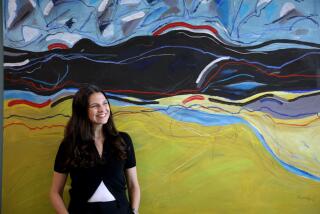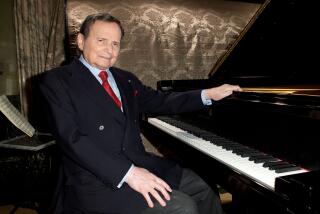Debbie Friedman, self-taught Jewish folk singer, dies at 59
Debbie Friedman, a self-taught Jewish folk singer and composer who transformed synagogue music and worship by infusing traditional prayers with a contemporary sensibility, died Sunday at Mission Hospital in Mission Viejo. She was 59.
The cause was complications of pneumonia from an unknown viral infection, said her sister, Cheryl Friedman.
Over the last four decades Friedman recorded more than 20 albums of songs that combine English and Hebrew texts with folk rhythms. Among her best-known compositions is “Mi Sheberach,” the Jewish prayer for healing. Written for a friend who was struggling to adjust to getting older, it became a staple of Reform Jewish services and a central part of the Jewish healing movement, which reaches out to people coping with serious illness.
The song was performed at a Tucson temple Sunday for Arizona Congresswoman Gabrielle Giffords, critically wounded during a shooting rampage the day before, as well as at healing services for Friedman after she became ill last week.
Friedman, a self-described child of the 1960s, somewhat resembled Joan Baez with her dark, closely cropped hair. She taught herself to play guitar and compose by listening to the music of artists such as Judy Collins, Carly Simon and the folk trio Peter, Paul and Mary.
“Debbie Friedman has carved a very powerful legacy in the Jewish world,” the trio’s Peter Yarrow, who performed with her at Carnegie Hall, said some years ago. “She took all the energies of the folk music that preceded it and turned it into something that directly related to Jewishness. I don’t think anybody else has done that, and she has done it brilliantly.”
Since last year, Friedman was a music instructor and artist-in-residence at the Los Angeles campus of Hebrew Union College, where she taught a course on using Jewish texts as a source for songs, sermons, and study.
“She led a revolution…. Her music is quite universal in the Jewish community,” Rabbi Richard Levy, a longtime friend and director of spiritual growth at the college, said Monday.
Her music is most popular in Reform and Conservative synagogues, but it has also been performed in Orthodox Jewish settings and in Christian churches.
Although Friedman’s modern twist on Jewish spiritual music met considerable resistance at first, she eventually led congregations as cantorial soloist, even though she was not an ordained cantor.
The daughter of a kosher butcher and a food service director, Friedman was born in Utica, N.Y., on Feb. 23, 1951, and moved with her family to St. Paul, Minn., when she was 6. She took piano lessons as a child and taught herself to play guitar at a Jewish summer camp when she was a teenager.
Instead of attending college, she moved to Israel after graduating from high school and lived on a kibbutz for six months. When she returned to the U.S., she began attending a St. Paul synagogue but found the services boring. “I realized the rabbi was talking, the choir was singing and nobody was doing anything. There was no participation,” she recalled in a 1995 interview with The Times.
Not long after, she was riding a bus from New Jersey to New York when a melody came into her head. She joined it to “V’ahavta,” a prayer about unity with God, and taught it to Jewish youths at a summer camp. Their reaction startled her. “All of a sudden they stood up, grabbed each other’s arms and joined in this prayer,” she said. “I realized something powerful was happening.”
The popularity of “V’ahavta” led her to make a demo. When she quickly sold 1,000 copies of the recording, she knew she had found her vocation.
“Music was the way she found to express her commitment to and love for Judaism, and that really was her calling,” Cheryl Friedman said of her sister, whose other survivors include her mother, Freda, of Laguna Hills, and sister Barbara Egli of Minnesota.
Several of Friedman’s songs are in the Reform prayer book, and some of her lyrics have appeared on Hallmark greeting cards. One of her most popular children’s compositions, the “Alef Bet Song” about the Hebrew alphabet, has been performed by Barney, the purple dinosaur from children’s TV.
Her primary objective was to “try to make prayer user friendly,” she told Reform Judaism magazine in 2002. “Because the music is in a familiar genre, people are able to make the connection between the music and the text. The real power is in the poetry of the liturgy, how moving and stirring it can be, connecting us to our deepest and most precious ideas, hopes, and fears.”
The funeral will be held at 11 a.m. Tuesday at Temple Beth Sholom, 2625 N. Tustin Ave., Santa Ana.
More to Read
Start your day right
Sign up for Essential California for the L.A. Times biggest news, features and recommendations in your inbox six days a week.
You may occasionally receive promotional content from the Los Angeles Times.







